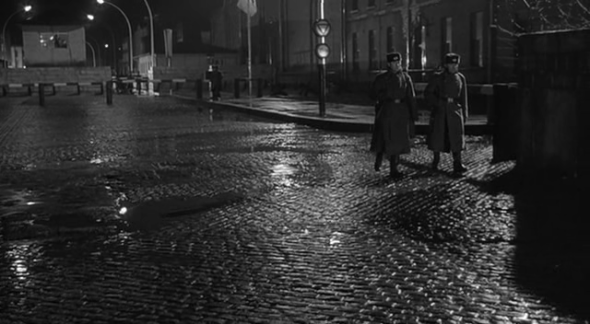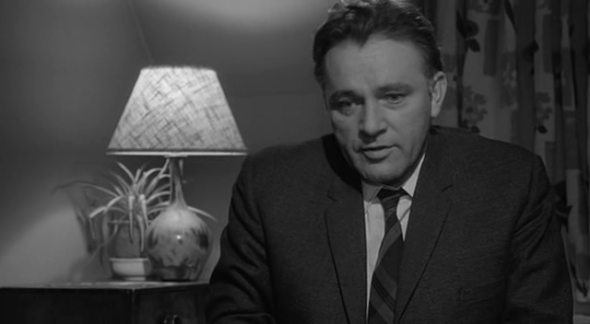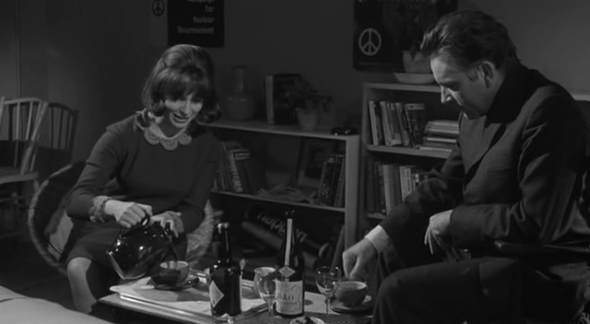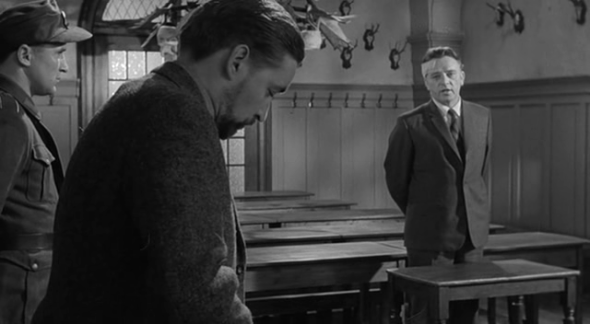The Spy Who Came In…
Adapted from the John le Carre novel of the same name, the first five minutes of Martin Ritt‘s The Spy Who Came in from the Cold will convince us that it’s not like any other ‘caper’ spy films, giving us melancholy piano and woodwind music hovering above the barbed Berlin Wall in the mid 60’s. Protagonist Alec Leamas (Richard Burton), an agent does a lot of waiting, needing coffee to stay up watching the border. The film lets us watch Alec and lets us into his head, only hearing his footsteps in the night. His conversations with soldiers aren’t racked up with tense music. In a few seconds, an Allied spy gets shot while trying to bike across the border. We see Alec for a half second as he watches his colleague die, but the film won’t let us see his eyes well up or glimmer in anger and vengeance.
Like any spy, Alec embarks on some method acting. Control pulls him away from Berlin back into London, is assigned to act like an alcoholic delinquent – I can hear some of you snarking that that’s not a stretch for Burton, but hold on. The goal is to make the Socialist agents in London think that he wants to defect, and he then plants false information that would implicate the higher powers of East Berlin to destroy each other. While working at a library that no one suspiciously visits, Alec meets a Communist woman named Nan Perry (Claire Bloom) and he grows fond of someone whose belief system is the target of his operation. I liked watching him challenge her. It shocked me to see an atheist character given a sympathetic, nuanced light in 1965, imagining that her character would be portrayed in a radically different way had this been a more American production.
The film also lets us into the more mundane parts of espionage life, letting us into tedious, unglamorous instructions by a head librarian which is subtly funny. Or detailed conversations between agents and double agents, Alec’s lies are a hazy prop compared to what’s really happening. He maneuvers his way within characters who refreshingly don’t look like movie stars.
I’m not sure if it’s the hair and make-up department who does the wonders here, but Oskar Werner, who plays Alec’s target Fiedler, has such a confident presence in the film compared to his wimpier turns in his collaborations with Francois Truffaut like Jules et Jim and Fahrenheit 451. he’s masculine yet subtle, commanding even for someone heading to a trap. Burton isn’t perfect in this movie. He can’t punch, and his last soliloquy in the end relies of his staccato delivery that might as well be his crutch. Other than that, this is his most subtle which makes it his career best in his movies that I’ve seen. It’s in his quietest moments when we can see him in his most vulnerable place, conveying the most emotion while just sitting there listening to another person. He deserves that Oscar nomination, showing us the human side of secret agents.
What things do you like?
‘Christmas,’ exclaims Louisa. “My Favourite Things,” a song from the infamously jolly movie musical The Sound of Music, reflects the bucolic existences of the nun turned governess Maria Rainer (Julie Andrews), and the kids get this too, Marta naming pussy willow (?) as one of her favourite things. She’d fit in well in Berlin. Liesl (Charmian Carr) names ‘telegrams,’ not just indicating Rolf, the creepy boy who sends them, but she also breaks the pastoral spell and naming something modern and technological. She’s becoming a modern woman, a potential improvement on Maria herself.
Kurt names ‘snakes,’ reminding Maria of his earlier pranks with her and showing that the kids aren’t devoid of personality after all. I’ve been watching movies where the main/’supporting’ characters listen to others to understand them, simply enough. Later in the film, a wet Maria shows her master Captain Georg (Christopher Plummer) that she’s been doing her homework with the kids and that she’s one step ahead of him.
This movie’s very much maligned, a friend of mine actually saying that if William Wyler directed the thing, the film would be more veracious with its time. And he’s not alone. But this movie is set in 1938. It accurately portrays an antebellum, when characters declare war through whispers, speculations and accusations, when the rich worry about their trifles and of what’s to come. Georg spanking his children is potentially as frightening as the Nazi ‘spider’ banners. It’s just as human to see joy in frightful times, while it’s insulting if a movie about say, our times is full of characters who are constantly depressed. A movie, like a nation, is allowed to reimagine its Arcadian past while anticipating is future, right?
Lastly, I don’t know if it’s just me, but the reprise for “The Sound of Music” sounds like it could fit well within a Summer of Love setting or concert. But then Captain had to ruin it, but not as much as these guys did.
Repulsion
Repulsion‘s first few minutes might be mistaken for a Godard film. A young Belgian woman named Carole (Catherine Deneuve) works as a manicurist. After work, her effortlessly chic self walks the streets of London to softly energetic non-diagetic jazz music, guys both working class and skinny tie-wearers (Jon Fraser) hit on her. She often looks like she’s daydreaming, her voice evinces little excitement. Instead of Carole’s politics, director Roman Polanski‘s more interested in the psychological conflict, which, in Carole’s case, is barely seen by the other characters until it’s too late.
Polanski doesn’t explain Carole’s building insanity in ways others have – relationship complexes, haunted histories, addictions. Instead, she notices a crack on a kitchen wall. Her sister’s (Yvonne Furneax) boyfriend Michael (Ian Hendry) calling her ‘the beautiful younger sister,’ a throwaway comment that Carole interprets as a menacing sexual come-on. A night after he stays over for sex, she sees him shirtless and her sister asks her how she slept the morning after. She then takes those little things and associate them with nightmares, as I imagine most people in a state like hers do.
It’s easy to say that instead of being silent, Carole should say how she feels. However, the film’s shows how words are inadequate since the other characters are reductive towards her. A customer tells Carole she’s in love – all problems are male related. Her boyfriend’s friends call her a tease. Also, her little acts of verbal resistance against her sister aren’t heeded. Her sister’s dismissal won’t help her talk about the terrible things she dreams about. I can’t settle on her real problem – fear of men, an idle mind, wanting to be alone. In other words, the other characters often think of a quick word or solution for her, and these quick solutions don’t help her slowly progressing dementia.
At first underwhelmed by Deneuve’s deadpan line delivery, easily enough an aspect of her character. She then thrills her audience as she responds to the walls of her apartment, or attacking men as if she’s a sleepwalker, using candlesticks and books like I’ve never imagined anyone doing. It’s hard to understand her in the first scenes of the film, but she perfectly fleshes out a new breed of character in horror film. She’s a monster within the victim in a genre that mostly shows the monster as external and separate from the victim. Deneuve’s Carole is groundbreaking in this and many other aspects, an integral part of Polanski’s vision of the macabre.
Related Articles
- Black Swans double vision (theglobeandmail.com)








